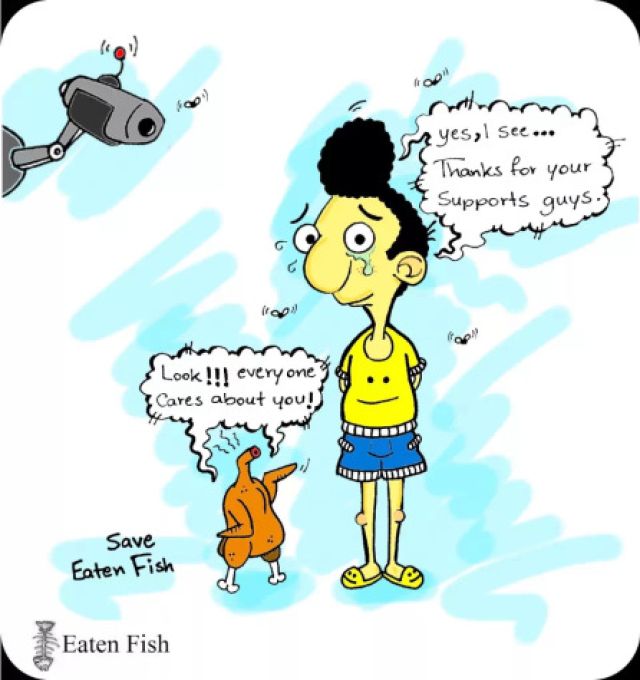
Eaten Fish
Iranian cartoonist Eaten Fish (Ali Duranti) ended his hunger strike after 18 days on February 18. He went on hunger strike to protest being sexually assaulted and guards ignoring his complaints, often bullying him in response.
Eaten Fish’s situation has gathered attention with lengthy articles about his situation, including some of his cartoons, being published in the Sydney Morning Herald and the Guardian. The Media Entertainment and Arts Alliance published an open letter signed by people working in the media industry calling for his release.
Eaten Fish has been in Manus Island detention centre since August 2013.
He was unable to properly complete his refugee claim due to severe mental health issues and regular panic attacks. As a result he was given a negative assessment and told to go back to Iran. But Iran does not accept people who have been forcibly deported so he is living in indefinites detention.
Eaten Fish said in a Facebook post: “I do not want to be made to suffer anymore. I need help and I need safety and I need proper treatment.”
Compensation claim
It is being called the largest trial on immigration detention in Australian history.
Law firm Slater and Gordon are representing more than 1900 asylum seekers and refugees who have been or are still detained in Manus Island detention centre in a class action lawsuit against the Australian government and private contractors such as Broadspectrum.
They are seeking compensation for physical and psychological injuries, as well as false imprisonment after the PNG Supreme Court ruled last year that the detention centre is unconstitutional.
Preparation for the trial has been going on for the past two and a half years. Lawyers hope the trial, beginning on May 1, will also shed more light on the horrific conditions in Nauru detention centre.
Phone ban
The Federal Court halted the Australian government’s plan to ban refugees and asylum seekers in detention from having mobile phones — at least for now.
The injunction, sought by lawyers at the National Justice Project, was handed down on February 19, hours before the ban was to come into effect. It is the first time a court has ruled on procedural matters inside detention centres.
Phones are vital for refugees in detention as their only means to communicate with lawyers, share their stories and information about the conditions in detention with the world and talk to friends.
There will be further court hearings on the phone ban.
Protests on Nauru
Refugees in Nauru detention centre have been holding daily protests since February 5. Photos show about a dozen people, sometimes including children and babies, behind a fence inside Nauru detention centres with a banner reading: “Stop scapegoating families, we need to join our families pls”. The photos show intimidating guards walking around.
They are joined by refugees who have been forcibly resettled on Nauru, who stand a couple of hundred metres away behind another fence.
The main focus is the issue of the separation of families. Many families have been separated as people are moved between detention centres and some are granted visas to Australia while others remain in detention. If the US refugee deal goes ahead, it is unlikely these families will be reunited.
The protests follow last year’s heroic protests on Nauru that continued for more than 230 consecutive days.
International Criminal Court
The International Criminal Court has been asked to investigate Australia’s treatment of refugees in a 115 page submission by the Global Legal Action Network.
They argue that Australia’s offshore detention centres are a crime against humanity and cite the Rome Statue which includes the definition: “imprisonment or other severe deprivation of physical liberty in violation of fundamental rules of international law”.
Lawyers are hoping the investigation can help stop current international trends of persecuting asylum seekers and refugees with governments implementing walls, bans and detention centres.
Like the article? Subscribe to Green Left now! You can also like us on Facebook and follow us on Twitter.